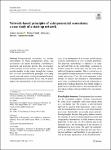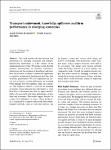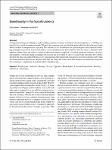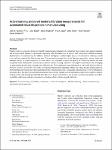Search
Author
- Osman, Ahmed I. (5)
- Daqing, Ma (3)
- Jorgensen, Ed (3)
- Li, Yan (3)
- next >
Subject
- kinh tế (26)
- Economics (12)
- programming (10)
- XRD (10)
- next >
Date issued
- 2020 - 2025 (2128)
- 2010 - 2019 (129)
- 2000 - 2009 (9)
- 1999 - 1999 (1)
Has File(s)
Search Results
Building on prior work examining discrete emotions and consumer behavior, the present research proposes that consumers are more likely to engage in the target sustainable behavior when marketers use an emotional appeal that matches the brand’s expressed values or one that is congruent with consumers’ value priority. In particular, we focus on two contrasting positive emotions—pride and awe. We show that the effectiveness of pride and awe appeals depends on the corresponding human values. Specifically, pride increases sustainable behavior and intentions when the self-enhancement value is prioritized; and awe increases sustainable behavior and intentions when the self-transcendence value is prioritized. Importantly, this interaction can be explained by enhanced self-efficacy. |
Using data on green patents filed at the European Patent Office from 1980 to 1984, this paper investigates the effect of increasing government R&D budget on green technology spillovers. Spillovers are measured with patent forward citations over the period 1981–1988. The level of government R&D budget is instrumented leveraging the unexpected occurrence of the Chernobyl nuclear accident—that exogenously pushed governments to reduce their energy-related R&D budgets—in a difference in differences setting. 2SLS results show that a 10% increase in government R&D increases by some 0.7% the number of citations received by green patents. Although positive and significant, the small magnitude of the estimated elasticity suggests that government R&D takes time to let innovation spillovers fro... |
Entrepreneurial ecosystems are wealthy environments in which entrepreneurs, firms, and governments can operate frictionless, contributing to innovation and economic growth. The investigation of the structure of such systems is an open issue. We provide insights on this aspect through the formulation of seven network-based principles associating specific network metrics to distinct structural features of entrepreneurial ecosystems. In this way, we aim to support the measurement of the structural characteristics of an entrepreneurial ecosystem and the design of policy interventions in case of unmet properties. The proposed methodology is applied to an original network built on the relationships occurring on Twitter among 612 noteworthy start-ups from seven different European countries... |
We introduce a novel concept of directed communication and a related connectedness in directed graphs, and apply this to model certain cooperation restrictions in cooperative games. In the literature on communication in directed networks or directed graphs, one can find different notions of connectedness, and different ways how directed communication restricts cooperation possibilities of players in a game. In this paper, we introduce a notion of connectedness in directed graphs that is based on directed paths. We assume that a coalition of players in a game can only cooperate if these players form a directed path in a directed communication graph. We define a restricted game following the same approach as Myerson for undirected communication situations, and consider the allocation ... |
We consider the problem of allocating divisible/indivisible goods to agents according to agents’ ordinal preferences. Hashimoto et al. [15] provided a nonalgorithmic and axiomatic characterization of well-studied probabilistic serial (PS) mechanism. Recently, Fujishige et al. [12] generalized the PS mechanism where goods are enlarged from a fixed set to a family of sets which is a polytope defined by a system of linear inequalities associated with submodular functions. The above extended PS (EPS) greatly improved the flexibility of allocations. Based on these two results, in this paper, we investigate the nonalgorithmic and axiomatic characterization of EPS. We show that the EPS rule is the only mechanism satisfying the ordinal fairness and a newly defined non-wastefulness. The subm... |
This article provides a systematic review of the extensive and fragmented literature focused on Digital Transformation (DT) and marketing by identifying the main themes and perspectives (i.e., employees, customers, and business processes) studied by previous research. By mapping the DT literature in the area of marketing, 117 articles, published between 2014 and 2020, have been identified. Through the adoption of a content analysis process, a multi-dimensional framework synthesizing the DT and marketing binomial has been provided. Results identify two thematical patterns: the macro-themes, related to the main digital technologies adopted within the marketing function, and the micro-themes, related to the effect/impact of these technologies on marketing processes and activities. |
This work explores the link between firm performance in emerging economies and transport infrastructure endowment, as a key element of the entrepreneurial ecosystem. We ground on the idea that transport infrastructures, by enabling connectivity, interactions and the exchange of knowledge and ideas, have the potential to enhance commercial opportunity recognition, technological development and, thus, firm economic performance. We also emphasize the crucial role of logistics system performance in providing better linkages between suppliers, firms and customers. The empirical analysis is focused on emerging economies whose infrastructure endowment is lower than those of developed ones; thus, its improvement is likely to be associated with better performance of their firms and economies... |
An important managerial challenge is understanding consumers’ reactions to stockouts of a desired product―will they stay brand loyal or switch to competing brands? We posit that consumers are more likely to prefer substitutes from the same brand when a stockout is unexpected (vs. expected). This tendency arises as consumers feel greater negative affect upon encountering an unexpected stockout, which leads them to choose alternatives that provide greater affective value to ameliorate their negative feelings. Since the brand is a relatively affect-rich attribute compared to common non-brand attributes (e.g., price and quantity), consumers facing an unexpected stockout are more likely to choose a same-brand substitute. Five studies illustrate the effect and support the process by demon... |
Quality control is a crucial activity performed by manufacturing enterprises to ensure that their products meet quality standards and avoid potential damage to the brand’s reputation. The decreased cost of sensors and connectivity enabled increasing digitalization of manufacturing. In addition, artificial intelligence enables higher degrees of automation, reducing overall costs and time required for defect inspection. This research compares three active learning approaches, having single and multiple oracles, to visual inspection. Six new metrics are proposed to assess the quality of calibration without the need for ground truth. Furthermore, this research explores whether existing calibrators can improve performance by leveraging an approximate ground truth to enlarge the calibrati... |
In an increasingly technology-oriented society, companies should ensure not only that they have an Internet presence but also that they are conveying the right image. According to the resource-based view, online reputation is a key intangible asset for successful technological business change. The aim of this research is to analyze the online reputation of companies in the agri-food sector, identifying the factors that have an impact on it. For this purpose, fuzzy-set qualitative comparative analysis is used. The results show that online reputation is conditioned by legal form and attributes associated with the company website. Such attributes include website quality, the presence of information associated with corporate social responsibility, the use of a secure connection, and the... |










